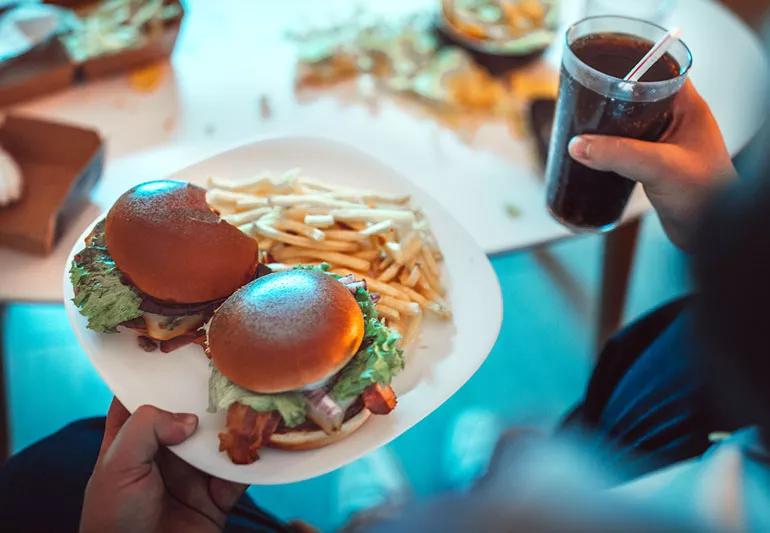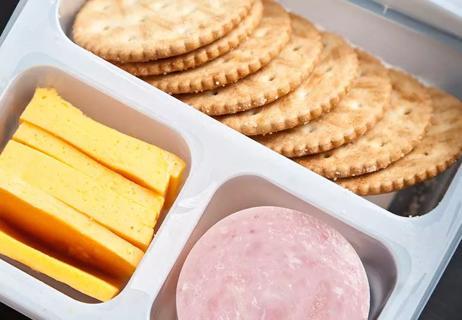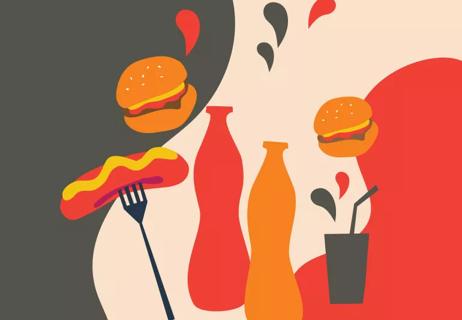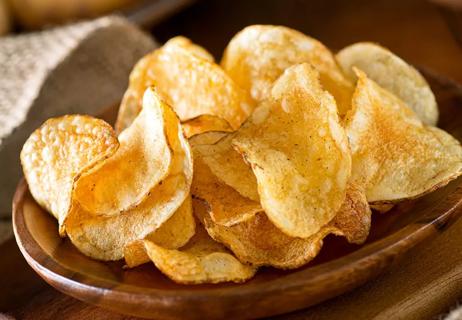Practical tips for curbing cravings and smart swaps

Ever feel like you have an endless craving for all the junk food — salty, sweet or both — that you can get your hands on?
Advertisement
Cleveland Clinic is a non-profit academic medical center. Advertising on our site helps support our mission. We do not endorse non-Cleveland Clinic products or services. Policy
You just can’t seem to give it up and keep eating, especially during times of heavy stress. And there’s certainly been plenty of stress to keep us hitting the bags of chocolate the last several months.
“Especially when we’re stressed, junk food often soothes us with the least amount of fuss and effort. We look for sugary and fatty foods to make us feel good,” says registered dietitian Beth Czerwony, RD. “But there are ways to get control of your food cravings, instead of them controlling you.”
Junk food is food that is unhealthy for you, just as the word “junk” implies. It runs the gamut from sickly sweet (think: cookies, candy and cake) to heavy on saturated fats (think: fried and processed foods). Eating too much junk food can have short- and long-term consequences for your body thanks to these ingredients.
Eating foods rich in saturated fats can increase your cholesterol levels and the amount of plaque in your blood vessels. “If you have blood vessels that are stiffening and not moving blood effectively, you have a higher risk for heart disease, including heart attacks and strokes,” says Czerwony.
Too much sugar in your diet can lead to weight gain, a risk factor for diabetes. Some animal studies also suggest that artificial sweeteners make our bodies resist insulin. This may also increase the likelihood of developing prediabetes, diabetes and heart disease.
Advertisement
“Most Americans are walking around with prediabetes, putting them at risk for developing Type 2 diabetes,” Czerwony adds. “Once you have diabetes, doctors treat you as if you’ve already had a heart attack because the rate of heart disease is so much higher. All of these health issues affect all the organs, so it’s important to get a handle on them.”
Czerwony lists four reasons you may be craving sweets and other junk food.
Unfortunately, our bodies are hard-wired to crave junk food. When you eat foods you enjoy, you stimulate the feel-good centers in your brain, triggering you to eat even more.
Especially in patients with excess weight and obesity, the brain’s reward processing system for food is like its mechanisms related to substance abuse. “Sugar makes us want to eat more sugar. Fat makes us want to eat more fat,” notes Czerwony. “Our brains are chasing that pleasurable state of food euphoria.”
Studies suggest that sleep deprivation is associated with increased hunger (especially snack and sweet cravings). And you can blame it on your hormones. Lack of sleep causes hormone shifts:
“If it’s normal for you to eat junk food, it can be hard to break that cycle,” explains Czerwony. “You’re used to not cooking, preparing or planning. You eat whatever’s on hand because that’s what you’ve always done.”
Stress, or emotional, eating really is a thing — and it’s the result of both nature and nurture. Some people find food helps distract them from negative thoughts and feelings. Others learned as children to use food to cope.
Hormones are also responsible. Like lack of sleep, ongoing stress causes the body to increase levels of cortisol and other hormones connected to hunger. Studies show this hormone tsunami increases appetite — along with your desire for sugary and fatty foods.
Czerwony says these strategies can help you master your food cravings:
Advertisement
Czerwony also emphasizes that it’s OK to ask for help when you’re feeling stuck. “Talk with your primary care physician or a registered dietitian. That’s what we’re here for: to educate and empower you to make better decisions. We can help you choose healthier options and modifications rather than focusing on things you have to cut.”
When you make an effort to understand what flavors you do and don’t like, it’s easier to find healthier alternatives. Czerwony offers a few ideas to get you started:
Try changing up the style of food instead of the food itself.
Figure out a great switch to keep you going.
Advertisement
Resisting food cravings is important if you’re trying to lose weight or reduce blood pressure or cholesterol. But there is such a thing as being too restrictive. “If you’re relatively healthy, at a healthy weight, and your blood pressure and blood sugar are on point, feel free to indulge if you plan for it,” Czerwony says.
“Many of my patients eat around their craving. When they want something chocolatey, they eat a piece of fruit that doesn’t hit the spot. Then they go for an ice pop with the same result … and it goes on,” Czerwony says.
Just eat what you’re craving, really enjoy it and be done with it,” she suggests. “That way, you’ll be satisfied and won’t need to go back for more.”
Advertisement
Learn more about our editorial process.
Advertisement

They’re full of calories and sometimes trans fats, which contribute to stomach issues, inflammation and a higher risk of having obesity and heart disease

This synthetic food dye must be removed from all foods by 2027 and from all medications by 2028 for health concerns

Stress, lack of sleep and not eating enough all contribute to sugar hankerings

They’ve been altered to include fats, starches, sugars and hydrogenated oils

WARNING: Bacteria could be present due to raw flour and eggs

And how to recognize the signs of addictive eating

From your mood to your heart and your gut

From rice cakes to veggie straws, their answers may surprise you

Wearing a scarf, adjusting your outdoor activities and following your asthma treatment plan can help limit breathing problems

Your diet in the weeks, days and hours ahead of your race can power you to the finish line

When someone guilt trips you, they’re using emotionally manipulative behavior to try to get you to act a certain way